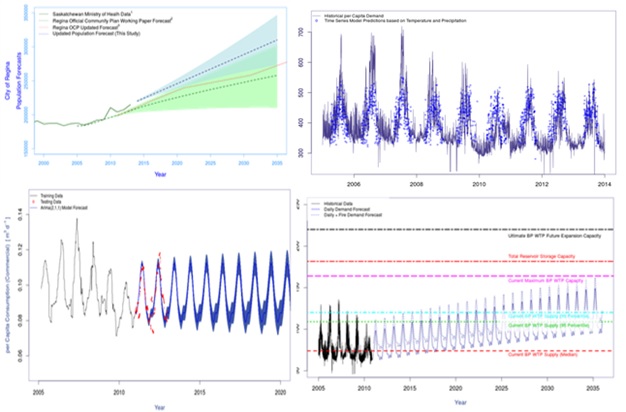Project Description
Client: City of Regina
Location: Regina, Saskatchewan
Assessment of Historical Water Use Trends and Long-Term Forecast of Water Demand in Regina (Based on Nine Years of Automated Meter Reading and Water Supply Data)
IDS was commissioned by the City of Regina to develop reliable models and innovative solutions to forecast water demand over the next 20 years using detailed data on City population, water consumption, and water supply over the past nine years. This project also involved assessing the adequacy of current system capacity for meeting future demand.

Challenge
The City of Regina is experiencing significant economic and population growth, which is projected to continue into the future. As competing priorities and limited financial resources continue to constrain the ability to make costly new investments to significantly expand the water system capacity, effective management of water use and loss levels is recognized to be the most cost-effective strategy to meet increasing demands.
Solution
An innovative solution to forecast water demand over the next 20 years was developed. Future water demand was forecasted based on historical demand time series, estimated population growth and per capita demand pattern over the next 20 years, while assuming the continuity of water use and supply trends and operational practices. Population was forecasted using an exponential smoothening space state model based on historical population data. The time series of per capita demand over the next 20 years was forecasted using an innovative autoregressive integrated moving average model. The total water demand over the next 20 years was then obtained by multiplying the forecasted time series of per capita demand and projected population. Other forecasting models were also developed to estimate the seasonality of total consumption for both residential and commercial service classes. The demand forecast also considered fire protection and regulatory requirements. The adequacy of the City of Regina’s storage and treatment capacity were assessed and compared to the forecasted demand over the next 20 years.
The resulting water demand forecast model will enable the development of defensible evidence-based plans to meet forecasted water demand and to gain deeper understanding of water consumption and supply trends in the City. The model will also help to justify planning decisions with regard to the system capacity and requirements for meeting future demand.
